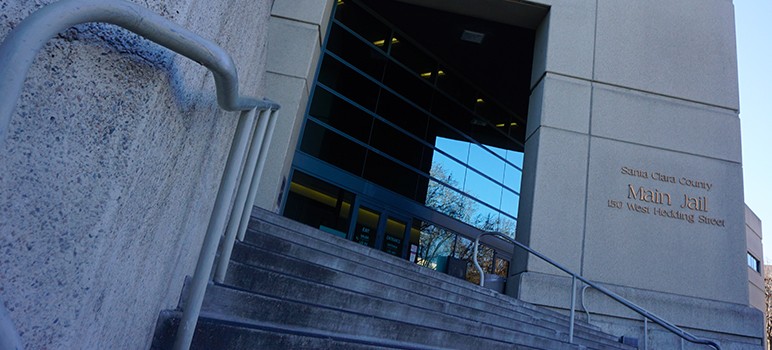After three years of negotiations, the Prison Law Office, Cooley LLP, and Santa Clara County have reached a settlement in a class action lawsuit claiming that some conditions in the county jails are unconstitutional and inhumane, county staff reported Tuesday.
Under the new agreement in Chavez v. County of Santa Clara, which comes after three years of intensive negotiations and still requires federal court approval, the county will pay the Berkeley-based Prison Law Office $1.6 million in legal fees and $200,000 a year for overseeing the county’s adherence with a three-to-five-year consent decree. The settlement binds the county to significant existing and future commitments to improve living conditions for inmates confined in the jail.
“Although the negotiations were long and difficult, the outcome will result in dramatic improvements to the jails that will help reduce recidivism,” Donald Specter, executive director of the Prison Law Office, said in a prepared statement. “During this process, Sheriff Laurie Smith and the county demonstrated leadership and complete transparency and dedication to finding solutions that addressed the deficiencies (including the use of force and solitary confinement) and negotiated this deal in good faith.”
The composition of the county’s inmate population, due in large part to the recent realignment that placed more state prisoners in county facilities, has placed additional pressures on the county jails, the county’s press release continues.
“For the last three years, the county has tackled necessary jail reforms in a collaborative, deliberative and transparent fashion resulting in improved conditions for inmates and their families, the staff and our community,” County Counsel James Williams said in a news release. “With this settlement complete, the county can now finalize its work on (its) larger efforts on jail reforms.”
In her statement issued Tuesday, Sheriff Smith added that she has “appreciated the professionalism of the Prison Law Office and Cooley LLP and the opportunity to work cooperatively to find common ground in the parties’ shared goal of providing appropriate conditions for inmates in the county’s custody.”
The Prison Law Office and experts will monitor the county’s implementation efforts to ensure compliance. Key points of the settlement agreement include:
- For all inmates, the county will make several modifications to the intake and booking process to better identify, monitor and address inmates’ medical, dental and mental health conditions as well as non-mobility and cognitive disabilities.
- For all inmates, the county will improve the delivery of medical, dental and mental health care while in custody through reduced wait times to be seen for health care concerns; revisions to the referral systems; and changes to the medication distribution and verification processes.
- For inmates with serious mental illnesses and cognitive disabilities, the county will make system-wide changes to the screening, classification, housing and management needs unique to these inmates.
- For inmates at risk of suicide, the county will make additional efforts at suicide prevention through revised triage and screening processes for evaluating inmates with suicidal behaviors, installation of suicide-resistant cells and changes to the way the jail supervises inmates at risk of suicide.
- For inmates with dental needs, the county will improve wait times and expand services to inmates incarcerated for longer periods.
- For inmates with vision, hearing and speech disabilities, the county will improve its identification and verification processes as well as its issuance, retention and provision of assistive devices; accommodate these inmates in improved housing; provide for effective communication and programmatic access; and track accommodations provided to these inmates.
- For inmates who engage in violence and, therefore, whose contact with inmates and staff must be reduced for the safety and security of the institution, the county will use a new, innovative phased approach, developed in consultation with experts, to house these inmates in what will be known as administrative management. This new approach will include specific admittance criteria and a high-level review for inmates who are retained for longer periods of time; notice to inmates regarding their placement; improved conditions on these units in the form of greater out-of-cell time and more meaningful out-of-cell opportunities; and an opportunity for inmates to demonstrate good behavior and return to a lesser restrictive setting.
- The sheriff’s office has developed a new use of force policy and implemented extensive training to correctional staff on the policy as well as de-escalation and conflict resolution training.
The federal court is scheduled to decide whether to grant preliminary approval to the settlement before the end of this year.
Attorneys for the nonprofit law firm began looking into jail conditions months before the murder of Michael Tyree, an inmate diagnosed with bipolar disorder who was fatally beaten in August of 2015 by three jail guards. The killing spurred the county to convene a reforms task force, which led to unprecedented changes at the county’s two jails.
Sheriff Smith called Tuesday’s settlement an important milestone in those reforms and took the opportunity to take a shot at her Nov. 6 re-election challenger, former jails chief and retired Undersheriff John Hirokawa.
“With the departure of the former Chief of Correction in 2016, I was disappointed by the stalled efforts and myriad of broken practices left behind,” she wrote in an emailed statement Tuesday. “We immediately rolled up our sleeves to implement progressive advancements in the care and service our custody operations provide to the community. We are proud of the work we have accomplished toward this end, but we have much more to achieve toward completing my advanced Jail Reform Plan. The speed and efficiency of these necessary changes are a testament to the dedication of the women and men of the Sheriff’s Office.”
This article first appeared in San Jose Inside’s sister publication, the Gilroy Dispatch.


And the lawyers win again. What a bunch of baloney. Just think if the prisoners didn’t break the law, there wouldn’t be the need for this frivolous lawsuit, where to me it’s the attorneys who should be in jail.